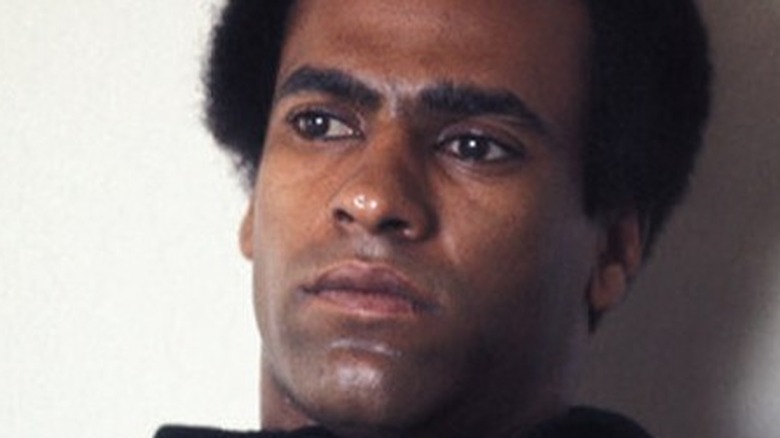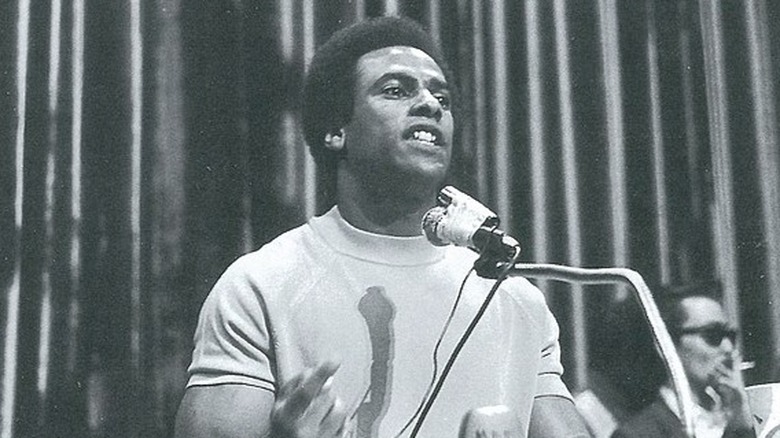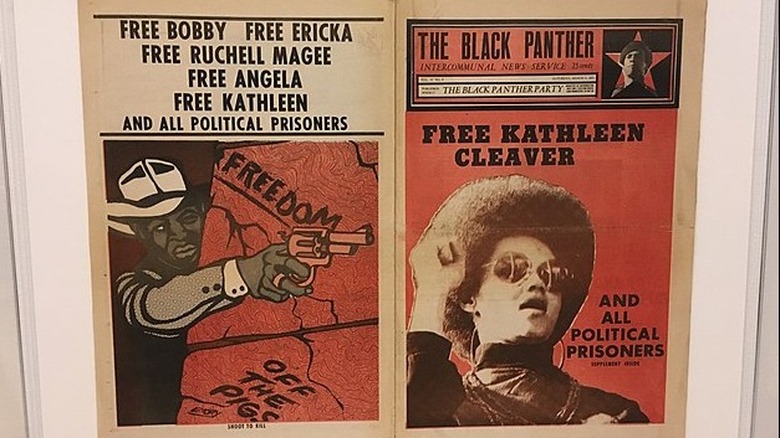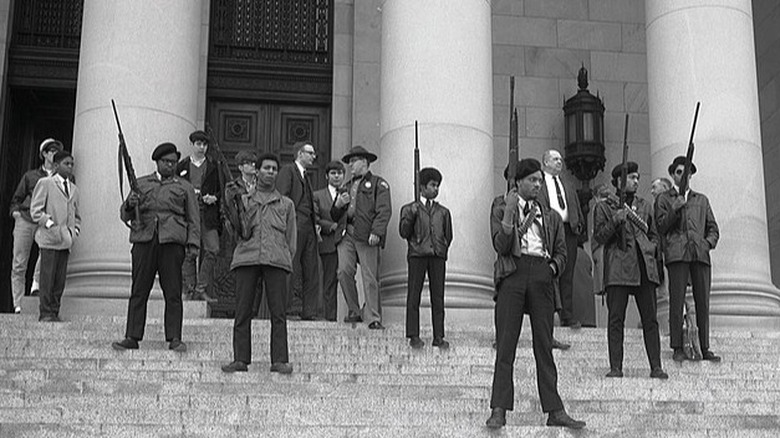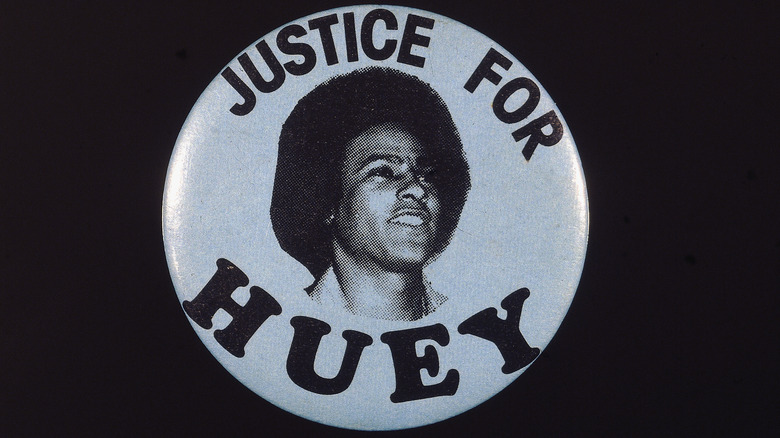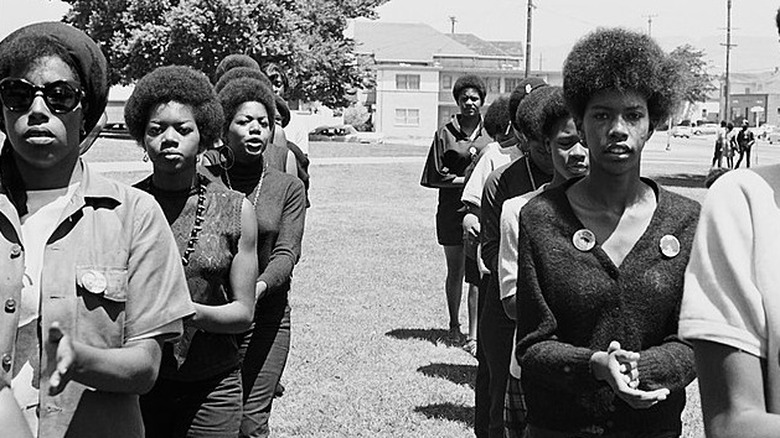The 1989 Murder Of Former Black Panther Leader Huey P Newton
On August 22, 1989, 47-year-old Huey P. Newton — co-founder of the Black Panther Party — was brutally murdered in Oakland, California, after supposed complications with drugs and another African American nationalist organization, known as the Black Guerrilla Family, according to Newsone. Newton was known for being a passionate activist for civil rights and equality under the law for African Americans. Tragically, later in his life, he succumbed to a drug addiction involving cocaine (via Newsone).
Relations between the Black Panther Party and the Black Guerrilla Family had been tense for many years, and the two groups often conflicted with each other, according to the National Archives. However, after a messy drug deal, Newton had spoken his last words, saying, "You can kill my body, and you can take my life but you can never kill my soul. My soul will live forever!" before being shot and killed by a 24-year-old Tyrone Robinson (via the National Archives).
If you or anyone you know is struggling with addiction issues, help is available. Visit the Substance Abuse and Mental Health Services Administration website or contact SAMHSA's National Helpline at 1-800-662-HELP (4357).
An activist for civil rights
Huey Percy Newton was born on February 17, 1942, in Monroe, Louisiana. When he was a young child, he and his family moved to Oakland, California (via School History). He was illiterate when he graduated from high school, but he taught himself how to read and write and eventually attended Meritt College. It was here where he met Bobby Seale, the other co-founder of the Black Panther Movement, according to History.
Newton had participated in protests at Merritt College, was a member of the Afro-American Association, and convinced the administration to offer classes on African American history, according to the National Archives. In October 1966, after the assassination of Malcolm X, Newton and Seale formed the Black Panther Party for Self-Defense, later shortened to just the Black Panther Party. Heavily inspired by Malcolm X's ideas and beliefs, the group believed that in order to achieve equality for African Americans, violence may be necessary (via the National Archives).
The Black Panther Party
The Black Panther Party had started many community programs that had made the organization increasingly popular in cities that had a high minority population, according to History. The Black Panther Party worked with churches to help provide free breakfast for young people, along with starting 13 free health clinics across the United States specifically aimed at helping African Americans (via History).
Opponents of the Black Panther Party did their best to portray the organization as a ruthless gang, due to some of the party's more intimidating tactics. It was not uncommon to see Black Panther Party members strolling the streets of Oakland, California, often carrying loaded guns and books of law, according to the Los Angeles Times. They would tune in to police radio, go to where arrests were taking place, and read constitutional rights to the person under arrest (via PBS). These confrontations with police weren't always peaceful, as shown by Newton's deadly shootout with police in 1967.
Plagued by violence
In October of 1967, Newton had been pulled over by police officers, and shootout had occurred between Newton and the officers, resulting in the death of one officer, and seriously wounding another; Newton being shot in the leg, according to Deleware State University. Newton was convicted of voluntary manslaughter in the year 1968 and served two years in prison before an appellate court determined that the case be overturned since the jury had received "improper deliberation instructions from the judge," according to the Los Angeles Times.
Other police conflicts with the Black Panther Party also occurred, such as in 1969 when Chicago police raided the apartment of Fred Hampton and Mark Clark. It was later determined that out of the 100 shots fired during the shootout, only one came from the Black Panthers (via History). Other acts of violence occurred inside the party, such as the murders of Alex Rackley and Betty Van Patter, who were believed to be working against the party, according to History.
Trouble with authority
After Newton's release in 1970, he took a visit to China after he had gained some notoriety on the international stage. In China, which at the time was one of the U.S.'s greatest enemies during the Cold War, Newton was lauded as a hero by crowds of Chinese citizens who were showing their support for the Black Panther Party and anti-imperialism, according to the National Archives.
Later in the 1970s, Newton had trouble with authorities again after he faced charges of murder and assault, which then led him to seek political asylum in Cuba (via the Los Angeles Times). After coming back to the United States in 1977, Newton faced prosecution for his charges, which resulted in hung juries on both. Newton was acquitted but faced new charges of illegal possession of a firearm in the years 1978 and 1979, which he was sentenced for in 1981, according to the Los Angeles Times.
Dissolution of the Party
Newton would eventually earn his Ph.D. from the University of California, according to Newsone. The Black Panther Party would officially dissolve in 1982 for a multitude of reasons, but mostly due to internal issues within the party, according to the National Archives. The main conflict occurred between Newton and Eldridge Cleaver; Newton believed that the party should primarily serve African American communities, whereas Cleaver believed that the party should help revolutionaries across the world (via the National Archives). The FBI's interference with the group also contributed to its dissolution, with the director of the FBI claiming that the Black Panther Party was "One of the greatest threats to the nation's internal security" and taking measures to weaken the organization, such as eliminating their free breakfast programs (via History).
Newton would go on to get involved with drugs and substance use, something he helped fight against in the early Black Panther days by helping young African Americans stray away from drugs (via the Los Angeles Times). Though Newton's drug use eventually cost him his life, his legacy still impacts people today with his contribution to the Civil Rights Movement.
If you or anyone you know is struggling with addiction issues, help is available. Visit the Substance Abuse and Mental Health Services Administration website or contact SAMHSA's National Helpline at 1-800-662-HELP (4357).
